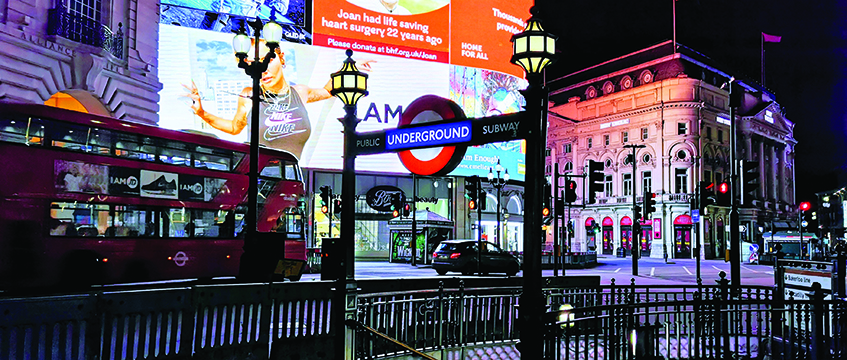Action plan launched to boost West End night-time economy
A new initiative aims to help the night-time economy in London’s West End recover to its pre-pandemic levels.
The Heart of London Business Alliance, a business improvement district covering the area, has launched the Evening and Night-Time Vision, Strategy and Action Plan in collaboration with urban design practice Publica.
The plan follows research from Arup that found the evening and night-time economies in the West End can contribute £14bn a year to the economy, employ more than 160,000 people and account for a quarter of all jobs in the area. The research defines such businesses as those operating between 6pm and 6am.
A new initiative aims to help the night-time economy in London’s West End recover to its pre-pandemic levels.
The Heart of London Business Alliance, a business improvement district covering the area, has launched the Evening and Night-Time Vision, Strategy and Action Plan in collaboration with urban design practice Publica.
The plan follows research from Arup that found the evening and night-time economies in the West End can contribute £14bn a year to the economy, employ more than 160,000 people and account for a quarter of all jobs in the area. The research defines such businesses as those operating between 6pm and 6am.
But pre-pandemic trends suggest the economy should now be worth £15.5bn rather than £14bn, and Arup’s research notes that the sector is facing a “perfect storm” of high living costs, supply chain disruption, high operating costs, staff shortages, antisocial behaviour, footfall stagnation and lack of facilities and amenities.
The culture and leisure segment of the night-time economy has suffered the most since 2019, shrinking 18% in terms of employment and 13% in GVA in 2020, and is still 7% below pre‑pandemic levels.
Launching the plan, Ros Morgan, chief executive of Heart of London, said: “The West End’s social value is tangible in the enjoyment and education and employment it offers.
“The evening and night-time economy stimulates other sectors, it supports creativity and attracts both workers and visitors. However, the West End’s evening and night-time economy is under-performing and struggling to recover from the pandemic.”
Looking beyond the obvious
The action plan has five overarching objectives: to recognise the value of the evening and night-time economy; make the area safer and more welcoming; serve more people with a diverse range of experiences and uses; attract and develop a world-class workforce and businesses to foster innovation; and improve inclusivity and access to the area.
Across those five goals are 77 recommendations, including diversifying the West End’s offer with new live music performances and more family-friendly events; encouraging day-time premises to experiment with later opening hours; improving the design of lighting in certain streets and spaces; supporting and investing in the next generation of night-time creatives; and piloting cultural events such as Art of London’s Art after Dark. The initiative will be overseen by a strategic board with five action groups, launching in June.
Real estate goals include working with property owner stakeholders to reimagine Piccadilly Circus as “a world-class public space to meet, day and night, and a spectacular gateway to the West End”; and brokering partnerships between and funding options for businesses looking for space and property owners with vacant properties.
Morgan said of the plan: “It looks beyond the obvious. It looks beyond a single industry or sector, beyond the day-to-day challenges of the city after dark, and instead embraces the evening and night-time economy and explores the whole kit and caboodle of what the West End needs to meet its full potential as a world-leading cultural and commercial city 24 hours a day, seven days a week.”
She added: “Investment in the area holds strong, with the private sector planning on investing more than £3bn over the next few years in the Heart of London area alone, in new buildings, infrastructure and better public spaces.”
Growing competition
Iman Less, night-time champion at Westminster City Council, said: “This puts forward an incredibly positive vision for the future of the West End that the council shares. Westminster and the West End is already a global destination – we have the best theatres, attract the best restaurants and have venues and neighbourhoods of tremendous cultural importance.”
But Less added that competition is growing – and the action plan notes that cities including Sydney, New York, Paris, Amsterdam and Berlin have all recently published visions, strategies and projects that promote their night-time economies.
“Covid-19 not only changed the sort of offer people are looking for, it changed the destinations the West End is competing with,” Less said.
“The offer of those regional, national and international alternatives is constantly improving and continually offering visitors more choice. We can’t be complacent in our work here.”
Amy Lamé, night czar for the Greater London Authority, said: “This is an area that helps drive, not just London’s economy, but also supports the wider UK economy. We know when London does well, the rest of the UK does well.
“Before the pandemic, our economy at night was actually growing faster than our economy was during the day, and we had everything to play for.
“But we’re living in complex and challenging times – increased cost of living, increased cost of doing business, high inflation, a lot of uncertainty hampering our recovery. That is why a strategy and action plan is more important than ever before
“We need to be able to plan how to best support businesses and create a prosperous, fair, diverse and sustainable 24-hour city.”
See property and land information for London>>
To send feedback, e-mail tim.burke@eg.co.uk or tweet @_tim_burke or @EGPropertyNews
Photo © George Morina/PEXELS











